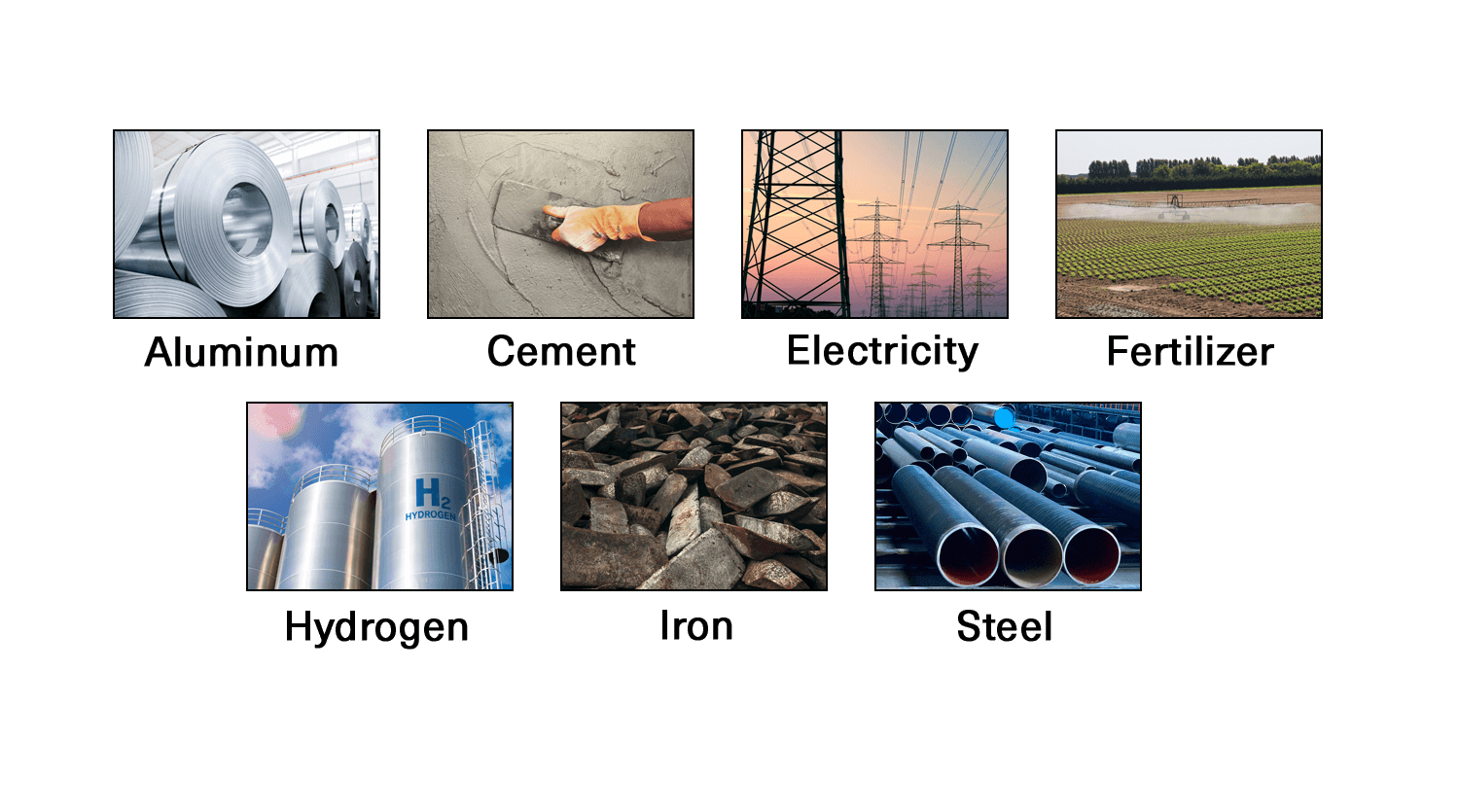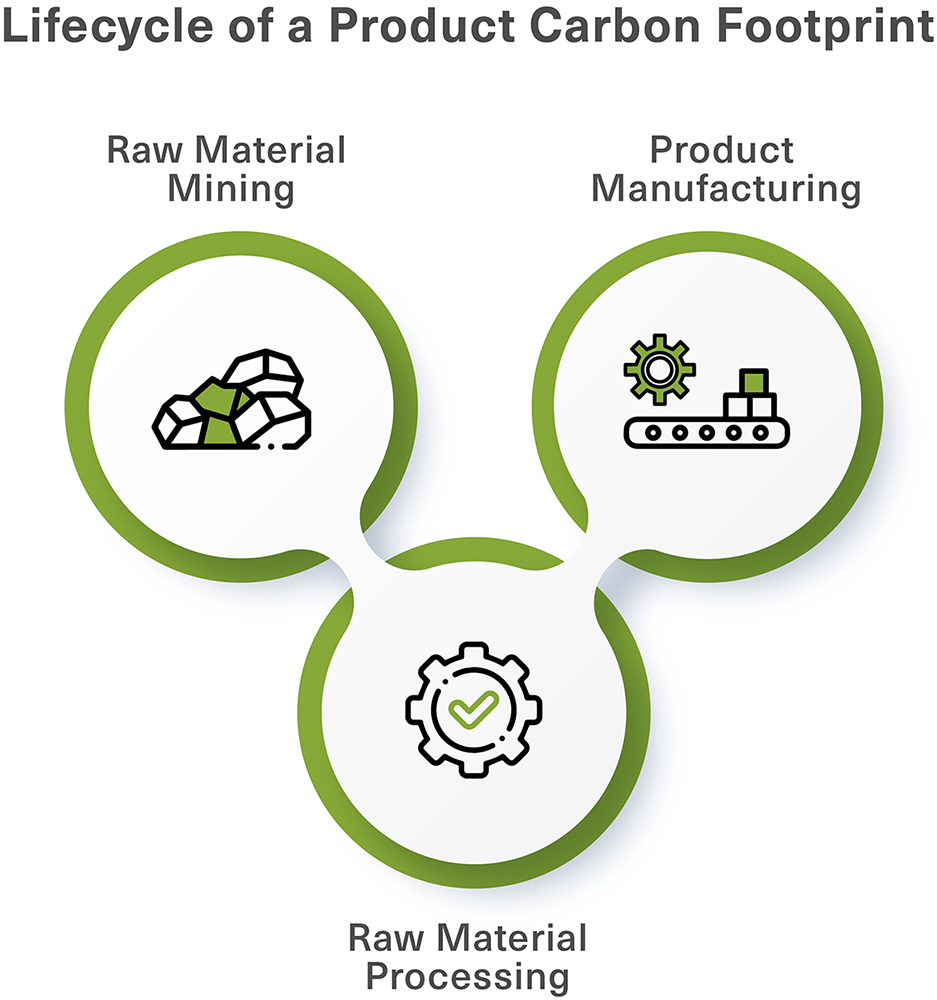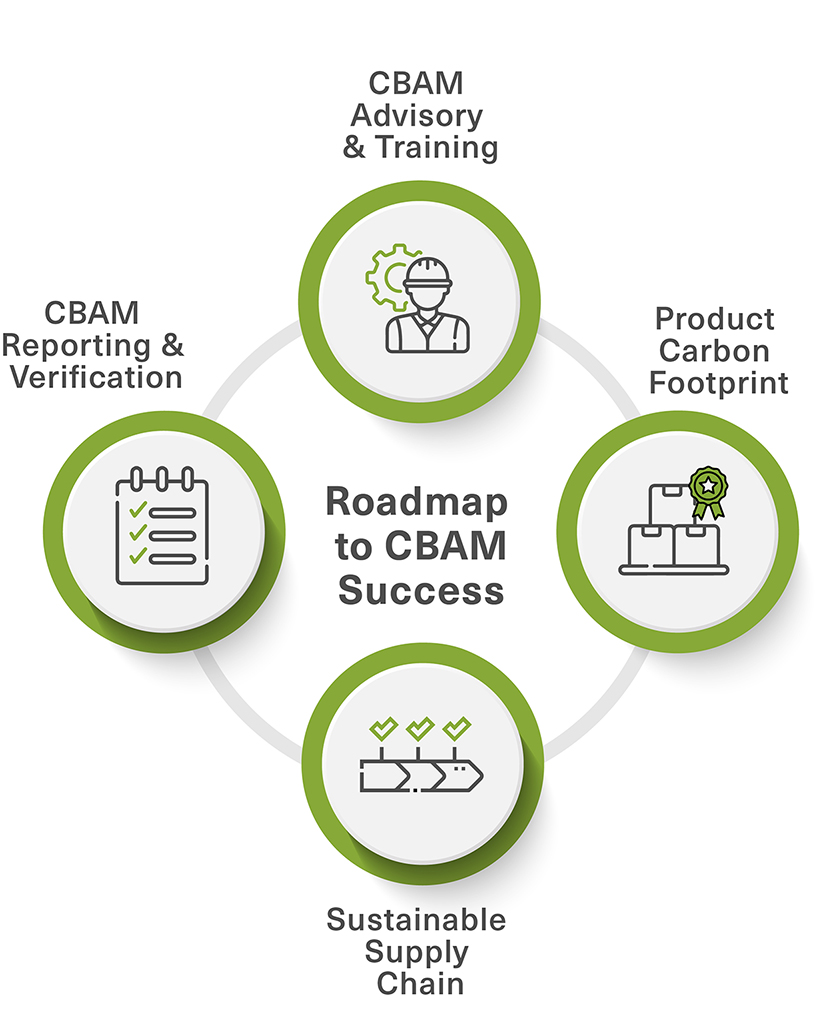Carbon Border Adjustment Mechanism (CBAM) Support
Carbon Footprinting, Verification, Certification, Reporting and Advisory Services

- Home /
- Services /
- Climate Change /
- Carbon Border Adjustment Mechanism (CBAM) Support
CBAM Business Group
What is the Carbon Border Adjustment Mechanism (CBAM)?
The CBAM regulation is an import tariff with the transitional reporting phase beginning October 1, 2023 through December 31, 2025. During this initial phase, quarterly reporting of direct greenhouse gas emissions for all categories of products will be required, as well as indirect greenhouse gas emissions for electricity, fertilizers and cement products. For global companies producing iron and steel, aluminum, electricity, cement, hydrogen and fertilizer products outside the European Union (EU), the new Carbon Border Adjustment Mechanism (CBAM) will provide significant logistical, reporting and financial challenges for importing into EU countries.

Starting in 2026, in addition to ongoing reporting, the CBAM will require importers of covered products to purchase and surrender "CBAM certificates" to cover the products' excess embedded emissions, at prices equivalent to those set for EU Emissions Trading System (EU ETS) allowances to ensure fair trade within the EU and to align with the EU’s policy to reduce climate change. Also starting in 2026, emissions reporting will require verification by an accredited verification body, and annual, verified CBAM declarations detailing the total embedded emissions and CBAM certificates offsetting those emissions for the prior year.
With more than 30 years of providing corporate and product carbon footprints for clients in various industries, SCS Global Services offers a one-stop-shop for assessment of your product’s Scope 1, 2, and 3 emissions in compliance with CBAM regulations. As an experienced Lifecycle Assessment (LCA) provider, SCS can examine your product carbon intensity over its full lifecycle, including raw material extraction, manufacturing, transportation and distribution, use, and end of life disposal, while providing deep insights into your supply chain.
Whether you’re a mine in Brazil, a manufacturer in China, or a processor in India, SCS has the technical experts to walk you through CBAM requirements and compliance, including reporting, data verification and report assurance. We use your primary data derived from your own business, products and supply chains, as opposed to generic data and industry averages, to ensure the most accurate emissions are being reported and taxed. SCS also offers Carbon Neutral Certification which enables the complete offsetting of your product footprint with verified carbon credits.

Why Choose SCS?
SCS brings 40 years of experience working in nearly every sector of the global economy to inform work in calculating GHG inventories for organizations. In addition, we have been a trusted, science-based sustainability service provider utilizing our well established LCA practice and experts to develop Scope 3 inventories for complex upstream and downstream categories for over 30 years. As part of our GHG inventory, verification, reporting and technical advisory services, SCS practitioners employ the most advanced accounting principles and GHG calculation methodologies, including the most up-to-date emissions factors, to ensure each company’s outcomes are authentic, unbiased and accurate. SCS is known throughout the world for the exceptional quality of our work; the ethics, reliability, and thoroughness of our auditors; and our quick response and follow-up to all inquiries and ongoing requests for information.

- EU CBAM
- Advisory
- Supply Chain
- Reporting & Verification
- Documents
SCS helps global companies measure the greenhouse gas impacts of their products across the entire lifecycle, from source to final end of life disposal. This includes the GHG emissions of raw material extraction from mines, transportation from mine to processing/manufacturing plant, manufacturing, transportation and distribution of end products, standard product use, and end of life disposal of the product.
CBAM Carbon Footprinting Methodology
The EU CBAM Regulation requires specific methodologies for carbon accounting in each of the target industries, that differ from accounting required by other commonly used standards like PAS 2050, WRI/WBCSD GHG Protocol, and the ISO/TS 14067 accounting methodology.
SCS will create EU CBAM compliant product carbon footprints using an accounting methodology that is fully aligned with the CBAM requirements and will continue to be updated as changes are made to the regulation over time. Companies can be assured that SCS has the expertise in determining both direct and indirect emissions for the wide variety of products included within the current scope of the EU CBAM regulation can enable companies to continue to successfully engage in and remain compliant with revised EU import regulations and tariffs.
Levels of impact captured by carbon footprint approaches vary based on the data collected, the impacts included, and the calculation methods used.
Product carbon footprints can be used as a basis for pursuing carbon neutral certification once verified. Learn more here.
The SCS CBAM Technical Team is available to help companies navigate the EU CBAM regulations. Our experts can help to educate corporate stakeholders on a variety of CBAM topics related to your specific business and products including but not limited to:
- Comprehensive CBAM training covering all aspects of the regulation as it applies to your company, industry and products
- Identification of products produced within your corporate holdings that fall under the CBAM regulation
- Understanding the calculation and reporting of emissions requirements for identified products, the methodologies that can be used, and the implications on supply chains, both upstream and downstream
- Cost analysis for potential impact beginning in 2026 when CBAM certificates will be required to offset product emissions
- How to navigate the CBAM Transitional Registry and the mechanisms for purchasing CBAM certificates (credits)
- Understanding the role of the EU Emissions Trading System in the pricing of CBAM certificates, how prices will fluctuate and how your products will be taxed
- Understanding future products that may be impacted by the CBAM regulation as the product scope is expanded over time
SCS offers a comprehensive line of sustainable supply chain management services that can help companies mitigate supply chain risk and enable advanced emissions reporting for an entire supply chain, both upstream and downstream. In addition, SCS can work all the way down the supply chain to develop accurate and science-based carbon inventories for your suppliers, including the certified responsible mining of raw materials, outsource transportation and distribution, raw material processors and manufacturers of finished goods that fall under the CBAM regulations and more.
SCS has more than two decades of experience in developing systems to collect data from suppliers, analyze their information, verify compliance to supplier criteria, and report, whether it is for internal supply chain management or to meet regulatory requirements such as CBAM.
SCS can support your organization’s efforts to build a sustainable supply chain strategy through the following:
- Supplier Data Collection
- Developing Key Performance Metrics
- Advanced Monitoring Tools
- Tailored Reporting
- Building positive supplier relationships
- Risk Mapping and Analysis
- Audit Inspection, Training, Oversight and Certification
- Multi-lingual capability
Learn more here.
Reporting and Verification services will soon be available from SCS as the CBAM regulations and reporting infrastructure, including the CBAM Transitional Registry, scheduled to be part of the CBAM Competent Authorities Traders Portal, are further developed by the EU Commission.
While the first CBAM report will be due no later than January 31, 2024 for the preceding quarter, as of this writing, and according to the CBAM Regulation, the following items will need to be reported:
- The total quantity of each type of product, identified by CN/tariff code, expressed in tonnes
- Country of origin
- The installation where the product was produced (and specifically for steel goods, where known, the identification number for the steel mill where the batch of raw materials originated)
- The production route used for the manufacturing of the product, which reflects the technological option and information on specific parameters qualifying the route chosen and descriptive parameters that affect the embedded emissions of the goods
- Actual total embedded emissions in tonnes of CO2 emitted for each tonne of the goods, which would be calculated according to the method listed in Annex IV of the CBAM Regulation, as further expanded upon in the draft implementing regulation
- The direct embedded emissions following the methods detailed in Annex III of the draft implementing
- For indirect emissions, the declarant must submit, amongst other details, the electricity consumption and the corresponding emissions factor, and
- Carbon price paid abroad
In order to ensure the efficient implementation of reporting obligations, an electronic database will be established by the EU Commission to collect the information reported during the transitional period. This Registry is scheduled to be available by October 1, 2023.
Verification of emissions data for products subject to the CBAM Regulation will not be required until the full implementation of the regulation starts in 2026. Further details will be forthcoming.








